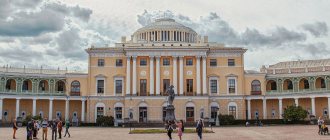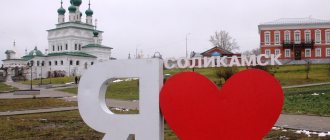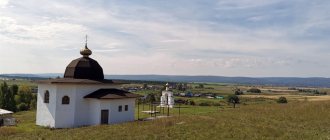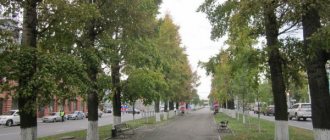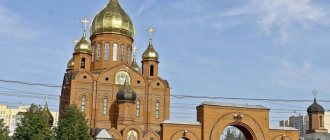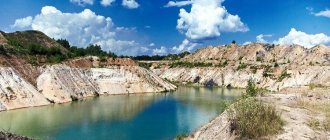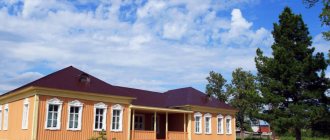The small town of Pavlovsk, Voronezh region, has a worthy history and an interesting historical and cultural heritage. The founder of the city, Peter I, founded it as a fortress and shipyard on the banks of the Don in 1709. It began to be called Pavlovsk later, in return for the fortress of St. Paul on the Sea of Azov, which was surrendered to Turkish troops.
The Russian navy was born in the city's shipyards. In modern terms, a military-industrial complex was created: foundry and cannon factories, rope and linen factories, and the Admiralty. The city had a permanent military garrison of five infantry regiments. Subsequently, St. Petersburg became the center of shipbuilding, but Pavlovsk did not lose its importance. After the island of Crimea became part of the Russian Empire, ships for the Black Sea Fleet were built here. The production of military sailing ships was supervised by Admiral A.N. Senyavin, commander of the Don (Azov) flotilla. The famous admiral F.F. Ushakov was also here. The memory of the famous naval commanders was immortalized by two memorial plaques on the walls of the Pavlovsk Navy Museum.
During the Great Patriotic War, the front line passed through the city. For almost six months, until January 1943, fascist troops sought to break through to Pavlovsk. The victory at Stalingrad threw back the enemy offensive. In memory of stubborn battles, a sculpture “Motherland” was erected in the city park, and a memorial was created in honor of the townspeople who died in the war.
What to see
Odintsov's mansion (1 Maya St., 20) is the calling card of Pavlovsk. The most beautiful ancient building, built in 1895, once belonged to the merchant Ivan Odintsov. Now there is a Museum of Local Lore. The front porch made of openwork cast iron is well preserved.
House of the merchant Odintsov. Photo from autogear.ru
The former real school (1 May Street, 13) was built in the neo-Baroque style in 1905. The school consisted of only two classes. And from 1924 to this day, the building has housed the Pedagogical College.
The building of the former real school
The Museum of the Russian Fleet (14 Revolyutsii Ave.) opened in 1996 and is located in the building of the Center for Children and Youth. The museum introduces visitors to the history of the Russian fleet. In Pavlovsk, at the shipyards organized by Peter I, the best ships of the imperial flotillas were built. Pavlovsk is also connected with the water theme by the fact that millions of years ago there was a sea here.
Exhibits of the Museum of the Russian Fleet. Photo from the museum group on VK
The Transfiguration Cathedral (Pokrovskaya, 9), which is more than 240 years old, is notable for its Swiss watches. They appeared at the cathedral in 1867 and are still on display.
Transfiguration Cathedral, photo from roseparhia.ru
Pre-revolutionary photo of the Transfiguration Cathedral
Cave temples. Not far from Pavlovsk is the village of Belogorye in the Podgorensky district. Here is the Resurrection Belogorsky Monastery (farm Kirpichi, Alexander Nevsky St., 1), which is more than 220 years old. The monastery is notable for its cave temples. The labyrinths themselves date back to approximately the 9th century; historians believe that they were built by the Khazars. The exact extent of the caves is unknown. So far, about a kilometer of cave passages with internal temples - Alexander Nevsky (lower) and the Holy Spirit (upper) - have been restored. And the depth of individual parts of the caves in the temple reaches 50 meters! It's cold in the caves even in summer, so don't forget to take warm clothes for the excursion.
One of the tunnels in the cave temple, photo from the website of the Resurrection Monastery
The Shipov Forest (near the village of Vorontsovka) is a unique natural monument. This is the largest island oak forest in the Black Earth Region. The ships of Peter the Great's flotilla were built from ancient forest trees. The oak grove, by the way, got its name from the English word “ship” - ship. Now the “youngest” oaks in the forest are no older than 150 years. The mighty giant Ideal Oak, whose height is 37 meters and diameter is 70 cm, is especially protected. The Thorn Forest is also known for the Chernavsky springs, which are nicknamed “Seven Wells”. The Shipova oak grove stretches from Pavlovsk to Buturlinovka, and near the village of Vorontsovka there is a protected ancient park with centuries-old oaks, birches and lindens.
An excerpt characterizing Pavlovsk (Voronezh region)
At one of the stations he overtook a convoy of Russian wounded. The Russian officer driving the transport, lounging on the front cart, shouted something, cursing the soldier with rude words. In the long German vans, six or more pale, bandaged and dirty wounded were shaking along the rocky road. Some of them spoke (he heard Russian dialect), others ate bread, the heaviest ones silently, with meek and painful childish sympathy, looked at the courier galloping past them. Prince Andrei ordered to stop and asked the soldier in what case they were wounded. “The day before yesterday on the Danube,” answered the soldier. Prince Andrei took out his wallet and gave the soldier three gold coins. “For everyone,” he added, turning to the approaching officer. “Get well, guys,” he addressed the soldiers, “there’s still a lot to do.” - What, Mr. Adjutant, what news? – the officer asked, apparently wanting to talk. - Good ones! “Forward,” he shouted to the driver and galloped on. It was already completely dark when Prince Andrei entered Brunn and saw himself surrounded by tall buildings, the lights of shops, house windows and lanterns, beautiful carriages rustling along the pavement and all that atmosphere of a large, lively city, which is always so attractive to a military man after the camp. Prince Andrei, despite the fast ride and sleepless night, approaching the palace, felt even more animated than the day before. Only the eyes sparkled with a feverish brilliance, and thoughts changed with extreme speed and clarity. All the details of the battle were vividly presented to him again, no longer vaguely, but definitely, in a condensed presentation, which he made in his imagination to Emperor Franz. He vividly imagined random questions that could be asked of him, and the answers that he would make to them. He believed that he would immediately be presented to the emperor. But at the large entrance of the palace an official ran out to him and, recognizing him as a courier, escorted him to another entrance. - From the corridor to the right; there, Euer Hochgeboren, [Your Highness,] you will find the adjutant on duty in the wing,” the official told him. - He takes you to the Minister of War. The adjutant on duty in the wing, who met Prince Andrei, asked him to wait and went to the Minister of War. Five minutes later, the aide-de-camp returned and, bending especially politely and letting Prince Andrei go ahead of him, led him through the corridor into the office where the Minister of War was working. The aide-de-camp, with his exquisite politeness, seemed to want to protect himself from the Russian adjutant’s attempts at familiarity. Prince Andrei's joyful feeling weakened significantly when he approached the door of the War Minister's office. He felt insulted, and the feeling of insult at that same moment, unnoticed by him, turned into a feeling of contempt, based on nothing. His resourceful mind at the same moment suggested to him the point of view from which he had the right to despise both the adjutant and the minister of war. “They must find it very easy to win victories without smelling gunpowder!” he thought. His eyes narrowed contemptuously; He entered the office of the Minister of War especially slowly. This feeling intensified even more when he saw the Minister of War sitting over a large table and for the first two minutes did not pay attention to the newcomer. The Minister of War lowered his bald head with gray temples between two wax candles and read, marking with a pencil, the papers. He finished reading without raising his head, when the door opened and footsteps were heard. “Take this and hand it over,” the Minister of War said to his adjutant, handing over the papers and not yet paying attention to the courier. Prince Andrei felt that either of all the affairs that occupied the Minister of War, the actions of Kutuzov’s army could least of all interest him, or it was necessary to let the Russian courier feel this. “But I don’t care at all,” he thought. The Minister of War moved the rest of the papers, aligned their edges with the edges and raised his head. He had a smart and characteristic head. But at the same moment as he turned to Prince Andrei, the intelligent and firm expression on the face of the Minister of War, apparently habitually and consciously changed: the stupid, feigned, not hiding his pretense, smile of a man who receives many petitioners one after another stopped on his face . – From General Field Marshal Kutuzov? - he asked. - Good news, I hope? Was there a collision with Mortier? Victory? It's time! He took the dispatch, which was addressed to him, and began to read it with a sad expression. - Oh my god! My God! Shmit! - he said in German. - What a misfortune, what a misfortune! Having run through the dispatch, he put it on the table and looked at Prince Andrei, apparently thinking about something. - Oh, what a misfortune! The matter, you say, is decisive? Mortier was not taken, however. (He thought.) I am very glad that you brought good news, although the death of Shmit is an expensive price to pay for victory. His Majesty will probably wish to see you, but not today. Thank you, rest. Tomorrow be on the way out after the parade. However, I'll let you know. The stupid smile that had disappeared during the conversation reappeared on the face of the Minister of War. - Goodbye, thank you very much. The Emperor will probably wish to see you,” he repeated and bowed his head. When Prince Andrei left the palace, he felt that all the interest and happiness brought to him by the victory had now been abandoned by him and transferred to the indifferent hands of the Minister of War and the courteous adjutant. His whole mindset instantly changed: the battle seemed to him like an old, distant memory. Prince Andrei stayed in Brunn with his friend, the Russian diplomat Bilibin. “Ah, dear prince, there is no nicer guest,” said Bilibin, going out to meet Prince Andrei. - Franz, the prince’s things are in my bedroom! - he turned to the servant who was seeing Bolkonsky off. - What, a harbinger of victory? Wonderful. And I’m sitting sick, as you can see. Prince Andrei, having washed and dressed, went out to the diplomat’s luxurious office and sat down to the prepared dinner. Bilibin calmly sat down by the fireplace. Prince Andrei, not only after his journey, but also after the entire campaign, during which he was deprived of all the comforts of cleanliness and grace of life, experienced a pleasant feeling of relaxation among those luxurious living conditions to which he had become accustomed since childhood. In addition, after the Austrian reception, he was pleased to talk, at least not in Russian (they spoke French), but with a Russian person who, he assumed, shared the general Russian disgust (now especially vividly felt) for the Austrians. Bilibin was a man of about thirty-five, single, in the same company as Prince Andrei. They knew each other back in St. Petersburg, but they became even closer on Prince Andrei’s last visit to Vienna together with Kutuzov. Just as Prince Andrei was a young man who promised to go far in the military field, so, and even more, did Bilibin promise in the diplomatic field. He was still a young man, but no longer a young diplomat, since he began serving at the age of sixteen, was in Paris, in Copenhagen, and now occupied a rather significant position in Vienna. Both the Chancellor and our envoy in Vienna knew him and valued him. He was not one of that large number of diplomats who are required to have only negative merits, not do well-known things and speak French in order to be very good diplomats; he was one of those diplomats who love and know how to work, and, despite his laziness, he sometimes spent the night at his desk. He worked equally well, no matter what the nature of the work was. He was not interested in the question “why?”, but in the question “how?”. What the diplomatic matter was, he didn’t care; but to draw up a circular, memorandum or report skillfully, accurately and gracefully - he found great pleasure in this. Bilibin's merits were valued, in addition to his written works, also by his art of addressing and speaking in higher spheres. Bilibin loved conversation just as he loved work, only when the conversation could be elegantly witty. In society, he constantly waited for an opportunity to say something remarkable and entered into conversation only under these conditions. Bilibin's conversation was constantly peppered with original witty, complete phrases of general interest. These phrases were produced in Bilibin’s internal laboratory, as if on purpose, of a portable nature, so that insignificant secular people could conveniently remember them and transfer them from living rooms to living rooms. And indeed, les mots de Bilibine se colportaient dans les salons de Vienne, [Bilibin’s reviews were distributed throughout Viennese living rooms] and often had an influence on so-called important matters. His thin, emaciated, yellowish face was all covered with large wrinkles, which always seemed as cleanly and diligently washed, like fingertips after a bath. The movements of these wrinkles constituted the main play of his physiognomy. Now his forehead wrinkled in wide folds, his eyebrows rose upward, now his eyebrows went down, and large wrinkles formed on his cheeks. The deep-set, small eyes always looked straight and cheerful. “Well, now tell us your exploits,” he said. Bolkonsky, in the most modest way, without ever mentioning himself, told the story and the reception of the Minister of War. “Ils m'ont recu avec ma nouvelle, comme un chien dans un jeu de quilles,” he concluded. Bilibin grinned and loosened the folds of his skin. “Cependant, mon cher,” he said, examining his nail from afar and picking up the skin above his left eye, “malgre la haute estime que je professe pour le Orthodox Russian army, j'avoue que votre victoire n'est pas des plus victorieuses.” [However, my dear, with all due respect to the Orthodox Russian army, I believe that your victory is not the most brilliant.]
Where to stay
If you want to spend more than one day in Pavlovsk, there are not many places to stay overnight. One of the main hotels in the city is “Onix” (Transportnaya str., 3). Cozy, clean and beautiful, there is a parking space, a swimming pool and Wi-Fi. The average cost per room is from 1,500 rubles per day in a double room. In another hotel in Pavlovsk “Don” (Klementa Gottwald, no. 4), a double economy class room will cost 900 rubles per day. The hotel has free parking, Wi-Fi, laundry services, a shared kitchen, pets can be accommodated for an additional fee of 300 rubles.
Born and lived in the city
- Martynov, Mikhail Filippovich (1863-1902) - bibliophile, collector
- Raevsky, Alexander Andreevich (1869-1928) - teacher, associate professor at Moscow State University, professor of law at Tomsk and Kharkov universities
- Voskoboynikov, Mikhail Mikhailovich (1873-1942) - zoologist
- Dubyansky, Vladimir Andreevich (1877-1962) - Doctor of Biological Sciences, professor, member of the Geographical Society of the USSR
- Zamyatnin, Sergei Nikolaevich (1899-1958) - candidate of historical sciences, archaeologist, collector
- Alexy (Konoplev) (1910-1988) - Master of Theology, Metropolitan of Kalinin and Kashinsky
- Vorvulev, Nikolai Dmitrievich (1917-1967) - opera singer, People's Artist of the USSR (1956)
- Saenko Ivan Ivanovich (October 17, 1983, Maslovka village, Voronezh region, spent his childhood in Pavlovsk) - Russian football player, midfielder. Bronze medalist at the 2008 European Championship as part of the Russian national team. Honored Master of Sports of Russia (2008).
- Azarov Igor Aleksandrovich (January 21, 1961) - Soviet and Russian composer and singer,
- Prokopenko, Igor Stanislavovich (February 8, 1965) - famous Russian documentarian and television journalist.
How to get there
From Voronezh to Pavlovsk 160 km. Buses depart from the central bus station in Voronezh; one-way ticket costs from 253 to 360 rubles. Travel time is from 2 hours 35 minutes to 3 hours 40 minutes excluding traffic jams.
By car this journey will take about two hours. From Friday noon, Saturday and Sunday, traffic jams form on the section of the M4 highway near the village of Losevo, so on these days travel time may increase by several hours. It is recommended to think through detour routes in advance.
You can find a driver companion using the BlaBlaCar service or the VKontakte group. BlaBlaCar users post more than 10 offers for trips from Voronezh to Pavlovsk every day. To travel to Pavlovsk with travel companions, you need to register on the website, indicating your phone number and email, briefly describe your interests, indicate your preferences (for example, attitude towards smoking, music in the cabin, pets). Drivers can be selected based on the ratings and reviews that other users left for them. Prices for fellow travelers vary from 200 to 300 rubles per person.
